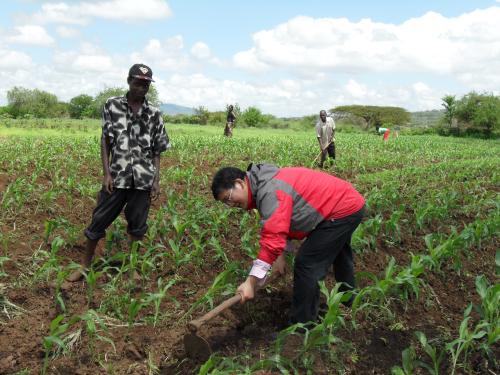|
 |
|
A Chinese scientist works on the farmland in Kenya COURTESY PHOTO |
Sino-African cooperation is increasingly becoming a headline-grabbing topic in China with the approach of the Fifth Ministerial Conference of the Forum on China-Africa Cooperation (FOCAC), to be held in Beijing in July 2012. In addition to FOCAC, China also uses multilateral platforms involving Africa to promote cooperation with the continent in various fields, such as the environment cooperation under the coordination of United Nations Environment Program (UNEP).
The program, known as UNEP-China-Africa Cooperation Program on Environment, started in November 2008, aiming to address the environmental challenges facing the continent in the field of ecosystem management, disaster reduction, climate change adaptation and renewable energy, through experience exchanges and information sharing with Chinese scientists. It is considered a great success story in South-South cooperation modality.
In November 2011, the agreement was renewed to expand the program activities to cover 16 African countries in the Nile, Lake Tanganyika and Sahara Desert regions.
Starting this issue, ChinAfrica will introduce a regular column on the projects under this program.
On a piece of farmland in Katumani, Kenya, a group of local farmers observe Chinese agricultural scientists from Lanzhou University, intrigued at the way in which they dig ridges and furrows and then cover the topsoil with mysterious materials to prevent water evaporation.
As a response to the food crisis in the Horn of Africa over the last decade, the Chinese agricultural scientists have been working in semiarid Machakos (a town close to Nairobi) in Kenya. Their mission is to introduce efficient but low-input rain-fed farming techniques to local farmers and technicians. According to Chinese scientists, the introduced techniques will be modified to meet local phenology and soil traits aiming at improving local grain yield and rainwater use efficiency to a large extent.
The project is called "Development and demonstration of water-saving techniques for dry land agriculture and agricultural mapping in Africa," a sub-project under the UNEP-China-Africa Cooperation Program on Environment. UNEP is responsible for coordinating the implementation of the project activities under the program. As the only UN agency with its headquarters in Africa, UNEP has so many advantages to offer when it comes to African issues through its Regional Office for Africa.
Water resource security is widely recognized as one of the vital factors for the development of Africa. The realization of environmental sustainability, poverty reduction and many other economic and social targets is largely dependent on the availability of water resources, highlighting the catalytic role of water in the years ahead and right now.
Yet, the water scarcity problem is not showing many positive signs now or future projections. By 2025, water availability in nine countries is projected to be less than 1,000 cubic meters/person/year. This situation is expected to worsen as a result of climate change, which will increase the frequency and duration of extreme weather events. Water has become a limiting factor for the sustainable development of Africa. In this regard, the aid from China comes at the right time.
Dr. Ephraim A. Mukisira, Director General of Kenya Agricultural Research Institute admitted that Kenya has been devoted to the development of efficient but cheap farming techniques in dry areas. Some parts of Kenya are typically arid and semiarid dry areas, a very similar agricultural condition also found in remote northwest of China. "We highly value the collaboration with China in dry land agriculture, and therefore are expecting the introduction of the techniques could help to guarantee the food security of Kenya," he said.
In Phase 1, a total of 11 African countries were actively involved in the program; more than 200 African experts and officials in related areas received professional training from China for capacity building. Many pilot projects were constructed in targeted African countries. After the preliminary consultation and investigation, Phase 2 is moving into the stage of implementation.
(Author Dr. Mohamed A.S. Abdel-Monem is the Regional Team Leader of Ecosystem Management in ROA/UNEP andw Ms. Tian Ping is his assistant focusing on the UNEP-China-Africa Cooperation Program on Environment) |